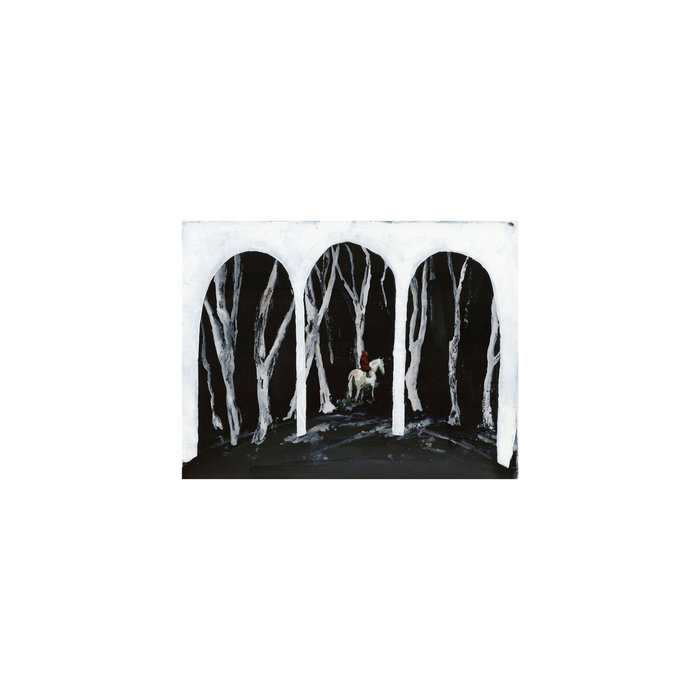One of the strengths of These New Puritans is how the expressive vulnerability of Jack Barnett’s vocals sit within the battering of twin brother George’s drumming. In this relationship, I’ve always heard a dance of the aggression and softness of masculinity, something that’s reinforced on their fifth album Crooked Wing by how it begins and ends with the full yet delicate voice of a treble voice from Southend Boys Choir. As the years have passed since I first saw what was then a fourpiece rattling away in tiny London venues, this dynamic has only become more pronounced. This is a band who can make music of the heart (as stunning duet with Caroline Polachek ‘Industrial Love Song’ proves) as well as the head and the body. As the mainstream has retreated from the sort of music that These New Puritans make, Jack and George Barnett seem to have responded by becoming ever more focused. With all facets of the corpus working in harmony, their music has an intimacy that isn’t inward-looking, but instead gives their art its intensity, in both execution and emotion.
This sense of the familial unit within place is one of the key undercurrents here, both in atmosphere and instrumentation. Grandad Barnett used to play the organ in ancient churches across the damp lowlands of East Essex, from the military closed zone of Foulness to the village of Stambridge. The chorister and some of the organ parts were recorded within these ancient structures (another church in Austria was also used). The organ, an instrument of such grand and unruly energy, is one of the defining sounds of this album as through its keys, pedals and stops, Jack Barnett reaches back and connects with what shaped the two brothers. In ‘The Old World’, a chorus line that feels like some ancient working song is suddenly overwhelmed by the richness of the pipes.
The second recurring sonic motif to Crooked Wing is the sound of bells, inspired by a field recording Jack Barnett made in a remote Greek Orthodox church that he’d discovered after a long walk up a gorge – something of a pilgrimage. Jack Barnett has said that the fragment was the key that opened up the writing process for the album, which he worked on in a North London studio situated between evangelical churches and a waste facility that he’s described as “a vision of Hell, a Bosch painting, just this ginormous rubbish dump.” This, and the bells and organs, gives Crooked Wing a psychedelically ecclesiastical feel, a collision of the sacred and the profane, a meeting of the sonic detritus left behind by an age that no longer has faith. There’s a romanticism in this yearning for the use of art to turn what surrounds us into the transcendent.
Barnett’s lyrics are loaded with imagery both rooted in nature and the esoteric – birds, lions, angels, gold horses, “blood-stained wings”, “blood ships”, rivers, seas and so on. ‘Wild Fields’, all left-hook right-hook drums, disembodied and monstrous breaths, is an exhortation to “come down / from the crystal heavens / from the wild fields above” with a warning that could be from the streets of Southend Centre of a Friday night: “I’ll drape your mouth in every town / with liquorice and violence”. This heady slurring of the metaphysical and the built environment is just so welcome. It can often feel as if a culture we pay too little attention to lyrics at the moment unless they’re speaking platitudes to self-empowerment or having a bit of a wry mumble that might as well be a recital of a shopping list, but on Crooked Wing, Jack Barnett operates a stunning phantasmagoria, otherworldly light gleaming on estuarine mud that’ll be gone in the next tide, or East Anglian church wall flint, in situ for a thousand years.
There aren’t many artists I would dare speak of in the same breath as William Blake, but These New Puritans tap into that same English unusual, the desire through hard graft to divine the magical from the everyday. Indeed, while These New Puritans’ early sound (and of course their name) led to comparisons with The Fall, these days its largely in the visionary quest that they most resemble Mark E Smith and his group, while in musical invention they have moved way beyond what they ever achieved. This can only work through the exquisite craft on display here, the ability to so finely hone using the tools available. This is a self-funded release, the Puritans all the more remarkable for being a DIY operation without ever sounding like one. The five core elements to the alchemy of Crooked Wing – vocals and lyrics and percussion from the brothers, the bells and the organ – are set alight through the arrangements and production of Jack Barnett and Graham Sutton, who paint vibraphone, French horn, fugelhorn, glockenspiel, upright bass, piano and so on around them to such exquisite ends.
Where 2019’s Inside The Rose at times recalled the 80s pop grandeur of Talk Talk and Tears For Fears, Crooked Wing is a gathering up of the Puritans’ sound into themselves. Romantics in every sense of the word, they sound so of this time, but entirely out it. In the drudging predictability of our algorithm and trend-driven age, this is a bold place for artists working to manipulate and conjure with the traditional rock and pop paradigms to be. Another masterpiece from this most singular of groups, Crooked Wing deserves to soar.


